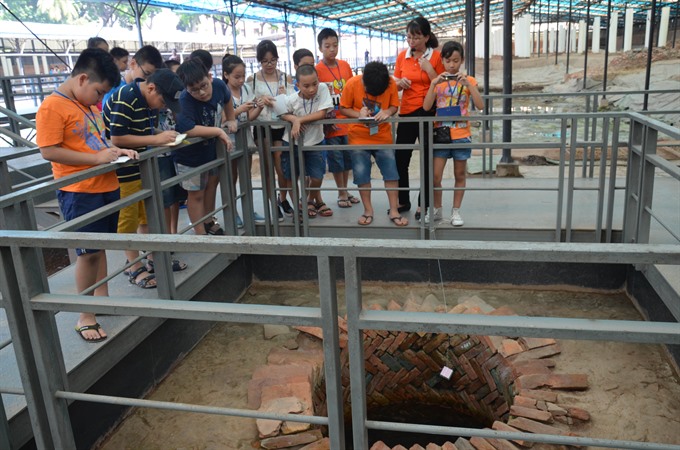 Society
Society

Overprotective parents are compromising the wholesome development of a considerable number of Vietnamese children, experts warn.
 |
| Students of Nguyễn Tri Phương Primary School attend an outdoor class at the Thăng Long Imperial Citadel, learning how to conserve the nation’s cultural and spiritual values. — VNA/VNS Photo Mai Linh |
HÀ NỘI – Overprotective parents are compromising the wholesome development of a considerable number of Vietnamese children, experts warn.
While it is natural that parents wish good things for their children and provide for them as much as they can, this can prove counterproductive, they say.
They say too much protection and support can turn into pressure that prevents children from exposing their talents or developing in a natural way that makes them most happy.
Dr Vũ Thu Hương, a primary education expert with the Hà Nội National University of Education, says a majority of Vietnamese children are suffering from developmental limitations because they are unduly pampered.
While there have been campaigns against parents giving themselves the right to decide their children’s future, their impact has not been significant, Hương tells the Lao Động (Labour) newspaper.
“Parents imposing decisions will destroy the children’s confidence and creativity,” Hương says.
Children can become passive, lack self confidence and determination, and even suffer chronic stress if they are made too dependent on their parents’ support, she adds.
She says that in some cases, parents are so anxious about their children’s future that they do not believe in their children’s capacity to survive in the society, especially when they face negative situations.
“This will cause serious psychological problems that persist when they become adults, and the weaknesses in their behaviour become apparent,” Hương says.
Overprotective parents are doing their children a disfavour because they unwittingly encourage irresponsibility, which will make it difficult for them in the future as they try to forge a career for themselves, she says.
The expert agrees with many others that the Vietnamese education system is also to blame for the current situation, particularly because of the teaching style that is not participatory.
Freedom of expression
Nguyễn Phương Linh. Director of the Management and Sustainable Development Centre (MSD), notes that the international convention on the Rights of the Child, which Việt Nam has signed, gives children the right to express their views in all areas.
Linh says children’s opinions should be respected and dealt with seriously by adults and authorities.
Việt Nam’s Children Law 2016 and many actions plans include legal corridors for children to participate in all social activities by giving their opinions and ensuring a safe environment to act and develop, Linh tells Lao Động.
However, the implementation of such laws is being hindered or rendered ineffective because some adults, including teachers and parents, continue to assert too much authority over children.
Linh says the truth is that at schools or in their families, children do not get many opportunities to express their opinions and views.
She cites as an example the case of the Nam Trung Yên Primary School in Hà Nội’s where students were forced to take part in a survey with answers prepared by adults, not themselves.
“They did not even have the right to say ‘no’ to such survesy,” Linh says.
Linh also criticises parents who pressurise their children to follow a career chosen for them, even if their children can’t do it or don’t want to do it.
In such cases, children unable to fulfill their parents’ dreams become easily disappointed and pessimistic, and tend to loose direction in life, she says.
Not well protected
Apart from the negative role of parents, many shortcomings have been found in the implementation of policies and laws dealing with children’s rights.
At a recent meeting organised in Hà Nội by the MSD and the Centre for Reseach and Development Communication (RED), experts focused on why so many cases of sexual abuse of children had come to light in recent days.
They expressed shock and disappointment that such cases were happening repeatedly without firm interventions from the authorities.
The experts felt Việt Nam’s legal system was not straight enough in deal with child abuse because it paid more attention to hard evidence rather than children’s circumstances and voices.
They agreed that ways would have to be found to give children a voice in policies designed to protect them. –VNS




